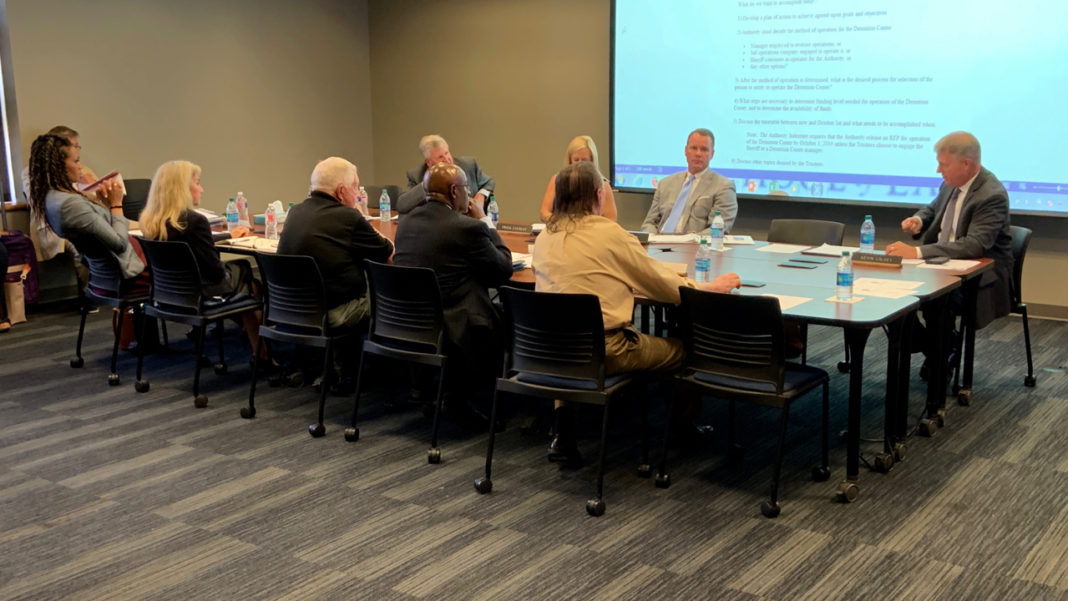The Oklahoma County Criminal Justice Authority or Jail Trust, met Monday for a special planning session with a facilitator and a number of spectators.
Trustees considered the value of a separate jail administrator to run the jail instead of the county sheriff, questioned the value of private companies that operate jails, and reassured current staff that they are valued and do have a future working at the jail.
Facilitated Planning
The Trust met in a classroom space in the Oklahoma City University Law School building with a paid facilitator.
The facilitator began the planning session by asking if the trustees had a shared idea of what they were present to accomplish. The answer never seemed entirely clear.
How the sausage gets made
Local government according to columnist Marty Peercy
Much of the discussion centered on the question of determining the role of a potential jail administrator. The County Jail has always been the purview of the County Sheriff.
Currently, the Sheriff’s Department operates the jail. The Undersheriff is the administrator of the jail by way of overseeing two captains who do the job of daily administration of the jail.
Now you, reader, know more than most other residents of Oklahoma County know about how the jail works.
Administrator
The Trust spent most of the meeting discussing relative pros and cons of hiring a Jail Administrator. The point was made several times that law enforcement and jail facility management are very different skills.
Sheriff P.D. Taylor took the opportunity to say that there were members of the Trust who had never toured the jail but were ready to hire an administrator for the facility.
He also pushed back against Ben Brown’s stated figure of $20 million in settlements having been paid out by the county on behalf of the jail, saying that it was a rumor and that the lion’s share of that figure was for unpaid hospital bills under the former sheriff’s administration.
Brown fired back that he wanted to see actual figures of the number of people who have died in the jail, the number of people who died after being transported to the hospital, and the amount of money paid out in settlements and lawsuits.
Three options
There were three options for jail management discussed.
- One was to simply continue to have the sheriff act as the jail administrator.
- The second was to hire a manager to be the administrator of the jail.
- The third option was to put out a call for bids from private jail management companies.
Brown said at one point that the companies that exist to manage detainment facilities are largely for-profit companies that have a financial interest in keeping people incarcerated.
Former Lieutenant Governor Todd Lamb weighed in on this topic. He stated that he was not trying to make a case for or against a private contractor.
But, he went on to say that it is easy for a government entity to get stuck in a bad relationship with a contractor. By the time a contract is ready to expire, that contractor has stored up hard-won institutional knowledge.
Lamb said that a sheriff has to answer to the public but that the public can’t vote out a contractor.
Employee Benefits
One point of agreement among all vocal Trustees has been the job security of people employed at the jail.
Sheriff Taylor said that uncertainty among those ranks have resulted in a high rate of turnover. He said that employees don’t know if they’ll have jobs or who they’ll be working for. “That’s why staff are walking out,” Taylor said.
Each individual trustee who spoke on this issue agreed that they wanted to formally reassure the staff at the jail that they would keep their jobs and all current benefits.
County Commissioner Kevin Calvey stated that regardless of the three proposed options for administration of the jail, the employees should be easily retained by management.
Three Motions
After many sophisticated and some rather unsophisticated violations of Robert’s Rules of Order, the body, with the capable assistance of legal counsel John Michael Williams, voted on three separate motions.
And allow me to underscore this point: it took what seemed like forever for this body to litigate and relitigate the proposed motions. This was a long, intense, in-the-weeds conversation of the Trustees.
The first motion was to request that counsel draft a proposal to vote to pursue hiring a jail administrator. I’ll give you a second to re-read that sentence. This motion was seconded and it passed with two nays. Sheriff Taylor voted nay.
Trustee Lamb voted nay “for now.” Vice-Chair Jim Couch voted aye “for now.” “For now” is not a typical third option in parliamentary procedure, but this Trust plays by its own rules, no quarter asked and none given. Wild West Jail Trust.
The second motion was that the Trust would ask counsel to assist with developing a process by which administration of the jail would be transferred from the Sheriff to an administrator. Again, Sheriff Taylor voted “nay” with a tone that suggested he had just pushed a heavy boulder up a mountain only to see it roll down the other side.
The third motion was to formally reassure employees at the jail that they would maintain their jobs and current benefits regardless of what decision the Trust makes regarding management of the jail. Some might say this was a risky promise to make, but who am I to judge?
Public Comment Comments
The remainder of the planning session was spent in the most improbably long and boring conversation about long and boring conversations.
The two previous meetings of this body saw significant attendance from members of the public wanting to speak to the Trust on the issue of ICE officers at the County Jail. All the trustees agreed that it was important to allow time for members of the public to address the body during public hearings.
The concern of some trustees is that if every meeting includes over an hour of public comment, it will be increasingly difficult for the body to perform the work they are assembled to accomplish.
In the end, the Trustees agreed that, as Trustee M.T. Berry said, if members of the public take time out of their day to come and talk to the Trust, the Trust should take the time to hear them.
Ultimately the Trust chose to formalize public comment thus:
- Public comment will be allowed on each agenda item
- Public comment will be limited to three minutes
- The public will be asked to limit repetitious messaging
- General public comment not related to specific agenda items will need to be “arguably relevant” to the business of the trust (which will be at the discretion of the Chair).
Tone of Collegiality
At the end of the meeting, Vice-Chair Jim Couch congratulated the body on their general tone of civility and collegiality and I was the only person in the room who laughed.
Columnist covering local government in Oklahoma City and Oklahoma County from May 2019 through June 2023.










